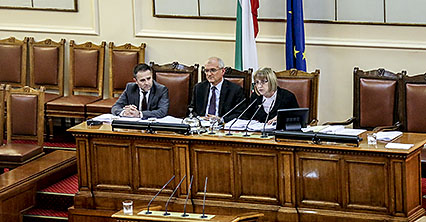News
The Parliament approved on first reading a new independent financial audit act
14/07/2016
 The Parliament approved on first reading a draft independent financial audit act. It transposes the provisions of EU directive and regulation into Bulgarian legislation.
The Parliament approved on first reading a draft independent financial audit act. It transposes the provisions of EU directive and regulation into Bulgarian legislation.The new act provides for tighter public oversight of registered auditors by increasing independence and granting adequate powers, including investigation, imposing sanctions and adoption of supervision measures. Enhanced is the role of audit committees at public interest entities in order to achieve high quality of statutory audit by additional reporting to the audit committee and improved communication with the registered auditor.
The draft act ensures a higher level of independence of registered auditors, prohibiting the rendering of particular services beyond audit. It provides for the minimum term of the contract for statutory audit to be one year and the maximum term of audit of a public interest entity by an audit company to be up to seven years while for the responsible auditor conducting the audit on behalf of the audit company the maximum term is four years.
The commission for public oversight of statutory auditors will be ultimately responsible for the supervision over acquiring the right to practice as registered auditor, the registration of auditors, including auditors from other EU Member States and from third countries. The Commission is responsible for the adoption and compliance with the professional ethic standards, for the internal control of the quality of work of registered auditors and for the carrying out of a financial audit and related services.
Deputies from all parliamentary groups highlighted the need of this law but made some comments on the draft act, including the envisaged joint audits. The Parliament decided the term for proposals on this draft act from first and second readings be extended to 14 days.
The Parliament adopted in first reading amendments to the Agricultural Land Ownership and Use Act.
The report of the Agriculture and Food Committee indicates that some of the texts envisage amendments to the intended use of municipal pastures and common lands. Repealed are texts setting out the cases in which a change in the intended use of such lands for non-agricultural use is permitted. Established is the procedure for changing the manner of durable use of municipal pastures and common land for other agricultural purposes. The change will be made by a decision of the municipal council, provided that the property is excluded from the scope of the specialized layer “Permanently grassed areas” and that a document is provided for it from the Regional Inspectorate of Environment and Water that there are no existing bans on or restrictions for changing the manner of durable use arising from the Biological Diversity Act and the Protected Territories Act or from plans for management of protected areas or protected territories.

Latest news
- 22/04/2021
The Parliament imposed a moratorium on concessions, real estate deals and appointments pending the election of a new cabinet or caretaker government - 16/04/2021
By 156 votes “in favour”, the National Assembly accepted the resignation of the Council of Ministers with Prime Minister Boyko Borisov - 15/04/2021
Speech by Mrs. Iva Miteva upon her election as a President of the 45th National Assembly - 15/04/2021
The Member of Parliament Iva Miteva was elected President of the 45th National Assembly - 15/04/2021
The Members of the 45th National Assembly were officially sworn in - 03/03/2021
The President of the National Assembly Tsveta Karayancheva and MPs attended the solemn fireworks-retreat on the occasion of the Liberation of Bulgaria - 03/03/2021
Every Bulgarian should preserve and honour the memory of those glorious ancestors, thanks to whom Bulgaria exists today, said the President of the National Assembly Tsveta Karayancheva in Gabrovo - 03/03/2021
Today we are on Shipka to pay our respects to all the heroes who sacrificed their lives for freedom, said the President of the National Assembly Tsveta Karayancheva after climbing Shipka Peak together with young people from all over the country - 02/03/2021
The Vice-President of the National Assembly Valeri Simeonov received an award from the Bulgarian Republican Self-Government in Hungary - 26/02/2021
The Parliament adopted at second reading amendments to the Measures Against Money Laundering Act
 Български
Български English
English